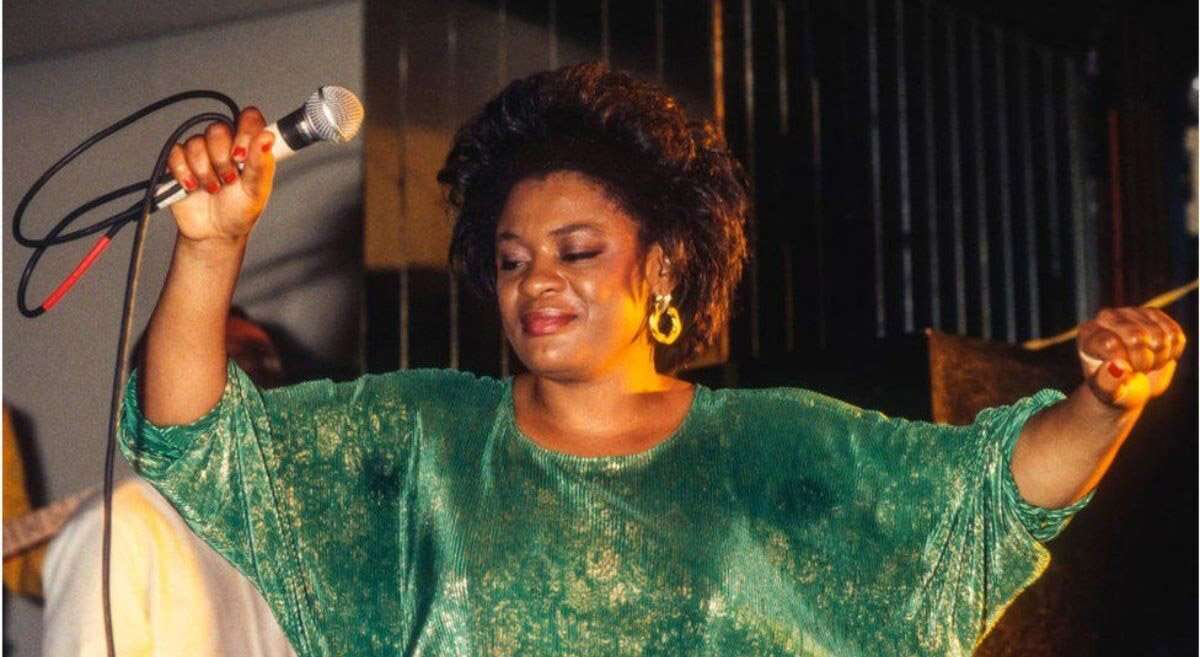Tshala Muana had no limits at her concert. In her prime, she stepped up with a wild, weird and wicked package. In her twilight, she had her vixens in raunchier outfits, gyrating and legging up in ways that only she could have taught.
This was Mutuashi, her world. She was the queen and the entire global audience her subjects. On stage, she would do what she wanted with her body and with her subjects — including thrusting heads of men to her loins.
“Mutuashi has been part of one of the veins of Congolese folk music since the dawn of time,” said Papy Tex Matolu, a cofounder of once popular Soukous group Empire Bakuba led by Pepe Kalle.
“Tshala Muana has only propelled this part of our Kasaian culture from which it originates to the global audience.”
American writer Gary Stewart, author of Rumba on the River, says in the book that Tshala Muana explained that Mutuashi was a Tshiluba word, “a shout of encouragement for dancers” that eventually became synonymous with the dance itself and with Tshala Muana herself too.
Tshala Muana brought Mutuashi from its heritage and served it to the world in a way that endeared her to audiences beyond the vast swathes of DR Congo, striking strong chords in Uganda where she remains arguably the most celebrated Congolese musician.
Her concerts were graced by the who-is-who of the society, mostly the men. Former army chief Gen James Kazini, former Speaker of Parliament James Wapakhabulo, Capt Mike Mukula, tycoon Godfrey Kirumira, and Trade Union Chief Usher Wilson Owere, among others, would show up like men who put promoter Tamukati at gun point to bring in the Queen of Mutuashi.
“The T in my name was inspired by seeing Tshala Muana’s because I thought it made the name Sheila look African,” said former MTN Uganda publicist Sheilah Kangwangye.
“I was only 13 and had discovered her music because rumba was the music my parents played when we were growing up. She was beautiful and her music! Even without knowing or understanding the language somehow, one just moved.”
Patrick Oyulu, a public relations guru added: “There is something about Tshala Muana that we Ugandans liked. She introduced what we call ‘Kimansulo’ (lurid dance). When she gyrated, she exposed legs, and men would dish out money for that. When ‘Dezo Dezo’ played, if you hadn’t paid your rent, you would go into hiding.”
Further east from the Congo into Kenya and to its south in Tanzania, her hit Karibu Yangu could have been claimed as a belonging. Karibu Yangu, in which a lover encourages her companion to get on and settle their marriage, is executed in Swahili.
It was one of the few songs she had recorded in a language other than Tshiluba. She had stuck to her mother tongue unlike most Congolese who sang in Lingala or French.
Mutuashi music was also distinct. Where rumba was driven by sizzling guitars, Mutuashi had heavy drumbeats and several instruments such as flutes, harmonica, timbales and keyboard incorporated to produce mellow beats.
Initially, Tshiluba appeared to limit her fame but Tshala Muana had no limit and with Mutuashi, she could conjure and capture all sorts of imaginations.
“I love the fact that she stayed in her lane singing in her indigenous language and promoting her heritage. This was very unique,” says Tshaka Mayanja, a Ugandan reggae artiste.
Nudged into Mutuashi
Tshala Muana, the firstborn of Amadeus Muidikay and Alphonsine Bambiwa Tumba, was originally conflicted in her music career, as Mutuashi dance had no place in rumba and her native Tshiluba did not sell. She had opted to sing in Lingala and French, like almost every other Congolese musician.
“It was her arranger Souzy Kasseya who convinced her to use Tshiluba as a unique style,” says celebrated animator and musician Djouna Mumbafu.
Apparently, Kasseya had seen enough in Tshala during her apprenticeship at M’Pongo Love’s Tcheke Tcheke Love band to confirm that the youngster was more confident singing in Tshiluba and dancing Mutuashi.
After two years with M’Pongo Love, Tshala joined Abeti Maskini, the doyenne of Congolese musicians who took in girls with dreams in music and honed their skills. She did not last more than three months with Maskini, moving on to play with producer Rashid King.
Unsettled, she joined Minzoto Wella Wella group only to flee Kinshasa, crossing River Congo into Brazzaville after a bitter fallout with her manager. Her destination was West Africa.
But one act of fate was still to play. M’Pongo Love was performing in Congo Brazzaville in 1981 when journeywoman Tshala Muana appeared and joined her queen dancers on stage.
“She danced Mutuashi to a standing ovation,” Bony Bikaye, who was with the band, recalls.
Kasseya stood nodding. “C’est ca, c’est ca!” he might have exclaimed to himself back then, six years before Tshala Muana would use the same words in the intro to her Karibu Yangu hit.
“This is it.”
And indeed it was. Kasseya concluded that Tshala Muana was Mutuashi and Mutuashi was Tshala Muana. The audience’s reaction, too, had convinced him that if Mutuashi could wow the crowd that much, then Tshala would find her place in it.
Tshala arrived in Abidjan in 1981 after trekking through Nigeria and Togo. She met Burkinabe producer Rain Ouedraogo, who introduced her to Ivorian musician Jimmy Hyacinthe. After an audition, she was told “Karibu Abidjan.”
Ouedraogo became her manager but also started seeing more than the nimble footwork in her choreography by looking higher up her dress. The relationship lasted as much as Tshala needed his connections in West Africa. They split in 1984.
According to Stewart, Tshala briefly flirted with a marriage proposal from Ivorian musician Francois Lougah “but in the end she turned him down.” She had decided to move to Paris, which saw as the capital of African music, and where she saw herself having “almost everything.”
If there was an adviser behind this decision, they could have been one of the people Tshala Muana had fleeting thought about on her deathbed at Hospital du Cinquantenaire in Kinshasa on Saturday, December 10.
The Queen claims her crown
Kasseya had kept in touch with Tshala Muana during her sojourn in West Africa. It was easy because this was the time Sam Mangwana was running African All-Stars and belting out Suzana Coulibaly on this part of the continent. West Africa was a fertile market for Congolese music.
In Paris, Kasseya tested Tshala’s touch. She gifted her Amina, written in French. It was produced in West African style, packed with brass that complimented Tshala’s vocals.
“Amina shake my hand even though you’re my opponent in this run-off. A man is like a hospital bed that takes in all the sick. When you are there, it’s you, when I’m there, it’s me.”
For a predominantly Muslim society, even the title of the song was touché. The two-track CD was never going to fail in Ivory Coast.
The B side of it had Tshebele, in Tshiluba and produced in deep Mutuashi style.
In 1986, Tshala finally returned to confront the ghost of the motherland she had fled in order to live. She was no longer bearing creases of sorrow. Like Kenyan Grace Odindo Okumu says, “she was a lady who had gone through a lot of pain but still managed to keep others happy.”
When she performed Cicatrice d’Amour (love scar) — popularly known as Chena — she hardly betrayed any pain but many would swear she was singing about herself. What Tshala does is pack her message with such tact that an abusive man would reform. She draws out every last emotion to bemoan the kind of domestic violence that leaves a woman with eternal scars.
The language matters for less in Cicatrice d’Amour; the mellow beats and mournful vocals more than touch every vein of her audiences. It is not surprising that this is one of the few of her Tshiluba songs whose lyrics are translated on the internet. It is that good.
A good soul rests
Born on March 13, 1958, Tshala and Kasseya initially produced fast paced songs and on stage, Manu Wenu, Dezo Dezo, among others, were as inviting as the legs that would be on display from Tshala and her vixens.
In Zambia in 1992, she caused a frenzy among her fans with security having to fire tear gas to contain them. Rev Stan Kristafor, Information minister at the time, moved to ban the Queen of Mutuashi, saying her dressing and dancing were too suggestive.
“Mutuashi is very sensual music so is that dance. I absolutely love how Mutuashi sounds, perfectly fitting the contemporary style of music. For a Bantu language, that’s quite unique actually.”
Kenyan radio journalist Simeon Mfumu Kibangu, who runs a weekly Congolese rumba show on KBC, is disturbed that some people saw anything provocative in Tshala Muana’s stage performances.
“Women everywhere shake what their mama gave them when they dance. Mutuashi is no different from many other cultural dances in Africa where women, mostly, shake what their mama gave them,” he said.
Outside stage, those who met her in person speak of a very approachable woman who had no air of celebrity and was the complete opposite of what she gave out on stage. Mfumu remembers meeting Tshala Muana in a hotel in Nairobi in the early 90s and it was like she had been expecting him.
“You just met her anywhere and she would respond to you. When we met, she didn’t display that kind of air you see with the Koffi [Olomide],” he said.
Tshaka said: “I met her once, [promoter] Tamukati introduced us. She was such a natural beauty, very soft-spoken and affable.”
Tshala Muana died on December 10, 2022 in Kinshasa, DR Congo, aged 64.



